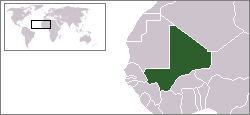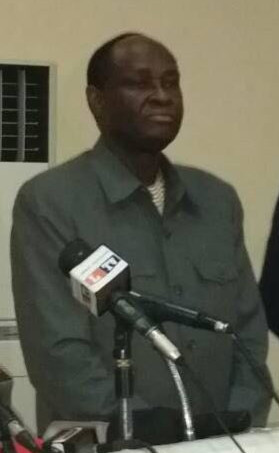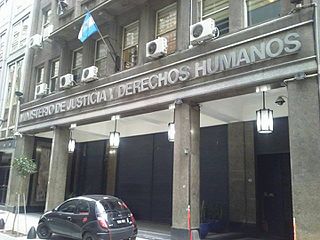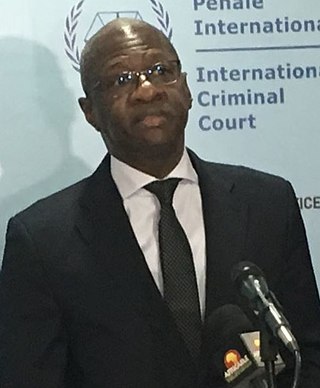
Mali, officially the Republic of Mali, is a landlocked country in West Africa. Mali is the eighth-largest country in Africa, with an area of over 1,241,238 square kilometres (479,245 sq mi). The country is bordered on the north by Algeria, on the east by Niger, on the northwest by Mauritania, on the south by Burkina Faso and Côte d'Ivoire, and on the west by Guinea and Senegal. The population of Mali is 21.9 million. 67% of its population was estimated to be under the age of 25 in 2017. Its capital and largest city is Bamako. It has 13 official languages, of which Bambara is the most spoken one.

Ahmed Ouyahia is an Algerian politician who was Prime Minister of Algeria four times. A career diplomat, he also served as Minister of Justice, and he was one of the founders of the Democratic National Rally (RND) as well as the party's secretary-general. He is considered by Western observers to be close to the military of Algeria and a member of the "eradicator" faction in the 1990s civil war against Islamist militants. Ouyahia resigned as Prime Minister in March 2019 following President Bouteflika's announcement that he would not seek reelection, and Ouyahia was arrested in June 2019 for crimes related to corruption. He was later convicted and is currently serving 19 years in jail.

Lesbian, gay, bisexual, and transgender (LGBT) people in Mali face legal and societal challenges not experienced by non-LGBT residents. Although homosexual activity is not illegal in Mali, LGBT people face homophobic discrimination among the broader population. According to the 2007 Pew Global Attitudes Project, 98 percent of Malian adults believe that homosexuality is "a way of life" that society should not accept, which was the highest rate of non-acceptance in the 45 countries surveyed.

Tiébilé Dramé is a Malian politician who served in the government of Mali as Minister of Foreign Affairs from 1991 to 1992. In the years since, he has remained active on the political scene, while also acting as a diplomat and mediator in regional crises. Since May 6, 2019 again served as the Minister of Foreign Affairs until the 2020 Malian coup d'état.

According to the U.S. Department of State's annual report on human rights in Mali for 2003, Mali's government generally respects the human rights of its citizens and observes relevant constitutional provisions and prohibitions.

The status and social roles of women in Mali have been formed by the complex interplay of a variety of traditions in ethnic communities, the rise and fall of the great Sahelien states, French colonial rule, independence, urbanisation, and postcolonial conflict and progress. Forming just less than half Mali's population, Malian women have sometimes been the center of matrilineal societies, but have always been crucial to the economic and social structure of this largely rural, agricultural society.
Mohamed Enver Surty is a South African politician who served as the Deputy Minister of Basic Education in the cabinet of President Cyril Ramaphosa from 2009 till 2019. He is a member of the African National Congress.
Johann van der Westhuizen (born 26 May 1952 in Windhoek, South West Africa is a former judge of the Constitutional Court of South Africa. Before his judicial appointment, he was a professor at the University of Pretoria Faculty of Law and the founding director of its Centre for Human Rights.

Ménaka is a town and urban commune in Ménaka Cercle and Ménaka Region in eastern Mali. It is the seat and the largest town in the cercle and region. The town is set amidst the rocky outcrops of the Ader Douchi hills, and is served by Ménaka Airport.
Fatoumata Dembélé Diarra is a Malian lawyer and judge. She was a judge for the International Criminal Tribunal for the former Yugoslavia (ICTY) and has been a judge of the International Criminal Court since 2003.
The Family Code is a significant legal framework that governs family and personal matters in the West African nation of Mali.

The Mali War is an ongoing conflict that started in January 2012 between the northern and southern parts of Mali in Africa. On 16 January 2012, several insurgent groups began fighting a campaign against the Malian government for independence or greater autonomy for northern Mali, which they called Azawad. The National Movement for the Liberation of Azawad (MNLA), an organization fighting to make this area of Mali an independent homeland for the Tuareg people, had taken control of the region by April 2012.

The International Criminal Court investigation in Mali or the Situation in the Republic of Mali is an ongoing investigation by the International Criminal Court (ICC) into war crimes and other crimes within the ICC's jurisdiction that are alleged to have occurred during the Northern Mali conflict since January 2012. The investigation was requested by the government of Mali in July 2012. As the first person who pleaded guilty to a charge of the ICC, al-Mahdi made a statement expressing remorse and advising others not to commit similar acts.

The Ministry of Justice and Human Rights of Argentina is a ministry of the national executive power tasked with enforcing of the law and administration of justice and upholding human rights.
The Ministry of Justice and Human Rights of Chile is the Ministry of State responsible for the law and judiciary. The current Minister of Justice and Human Rights is Luis Cordero, who has served since January 11, 2023.

Mamadou Ismaïla Konate is a Malian lawyer. He started his career at PricewaterhouseCoopers before creating his own firm in Bamako, Jurifis Consult, in 1998. On the 7th of July 2016 he was appointed Malian Secretary of State for Justice and took leave from the Paris and Bamako Bars and from his firm. He left office on 27 November 2017.

Kamissa Camara is a Malian political analyst and politician. She is the former chief of staff to the President of Malian Republic after she resigned from the position on September 24, 2020.

On March 23, 2019, several attacks by gunmen killed a reported 160 Fulani herders in central Mali. The violence came in the aftermath of the Malian government cracking down on Islamic terror cells in the country. Two villages, Ogossagou and Welingara, were particularly affected.
The Moura massacre was carried out by Malian Armed Forces and Russian mercenaries from the Wagner Group between 27 and 31 March 2022, in the central Malian town of Moura, Mopti Region in conflict with Al-Qaeda in the Islamic Maghreb's Jama'at Nasr al-Islam wal Muslimin. Over 300 civilians are alleged to have been killed according to US-based Human Rights Watch.
Events in the year 2022 in Mali.












